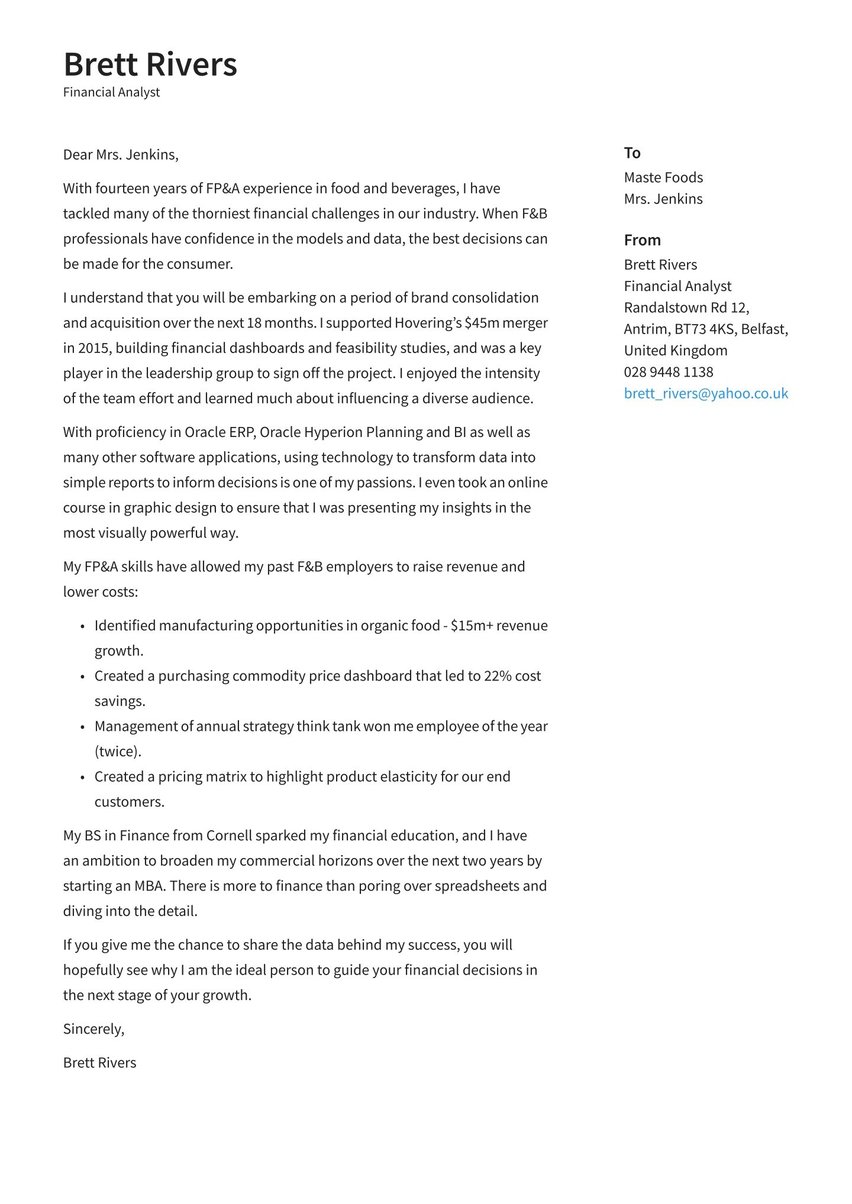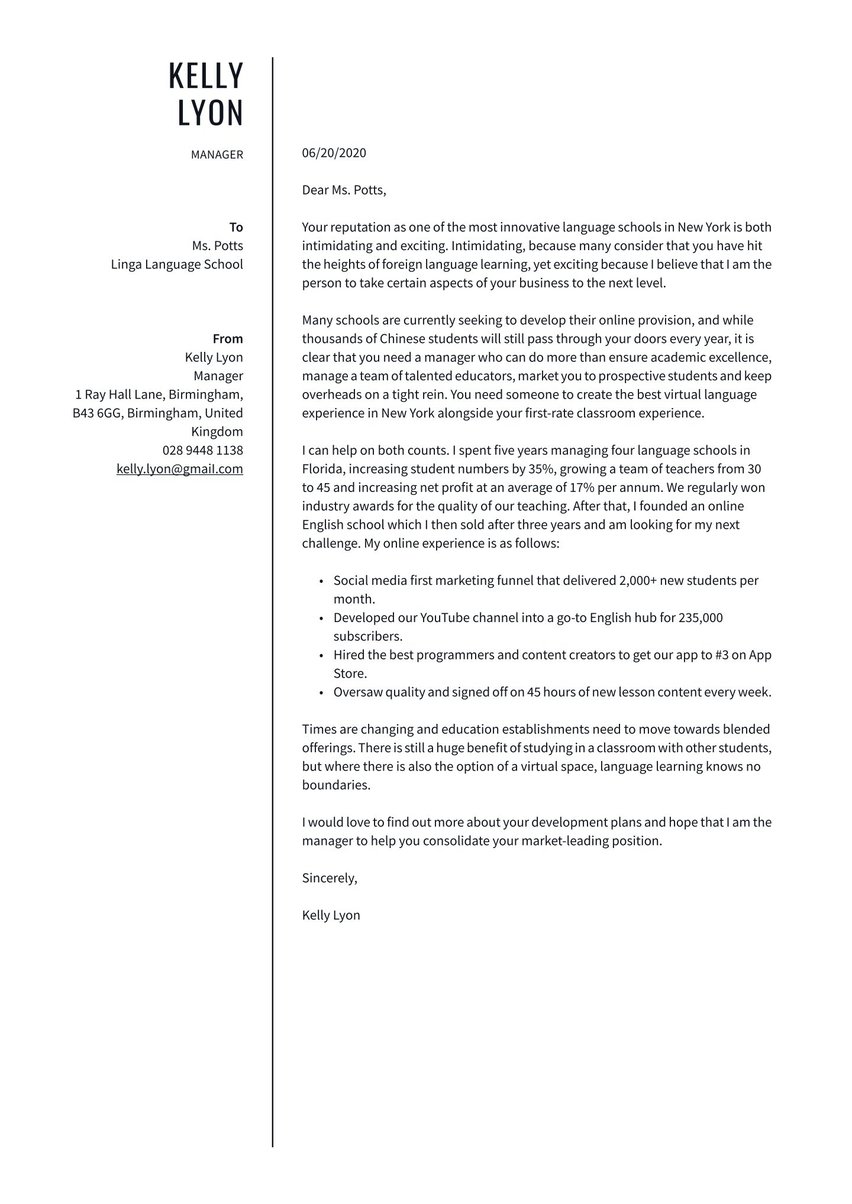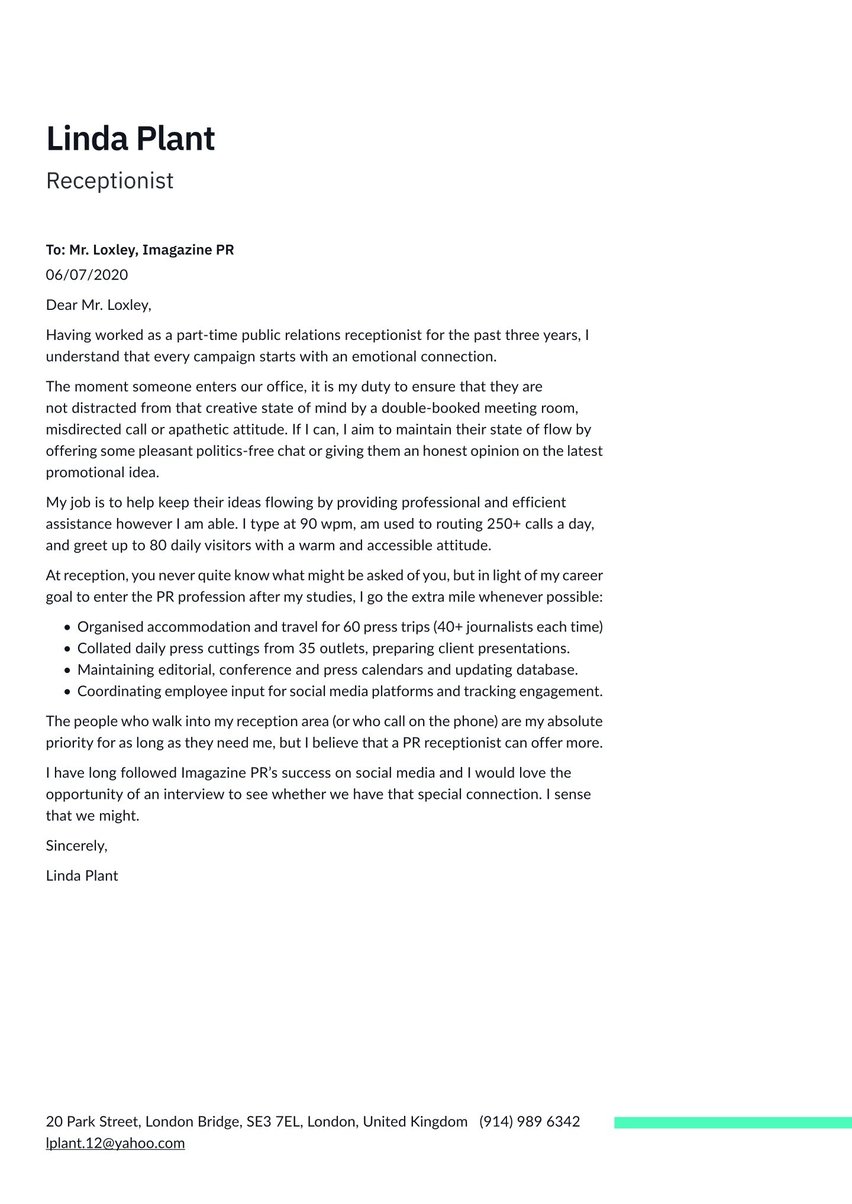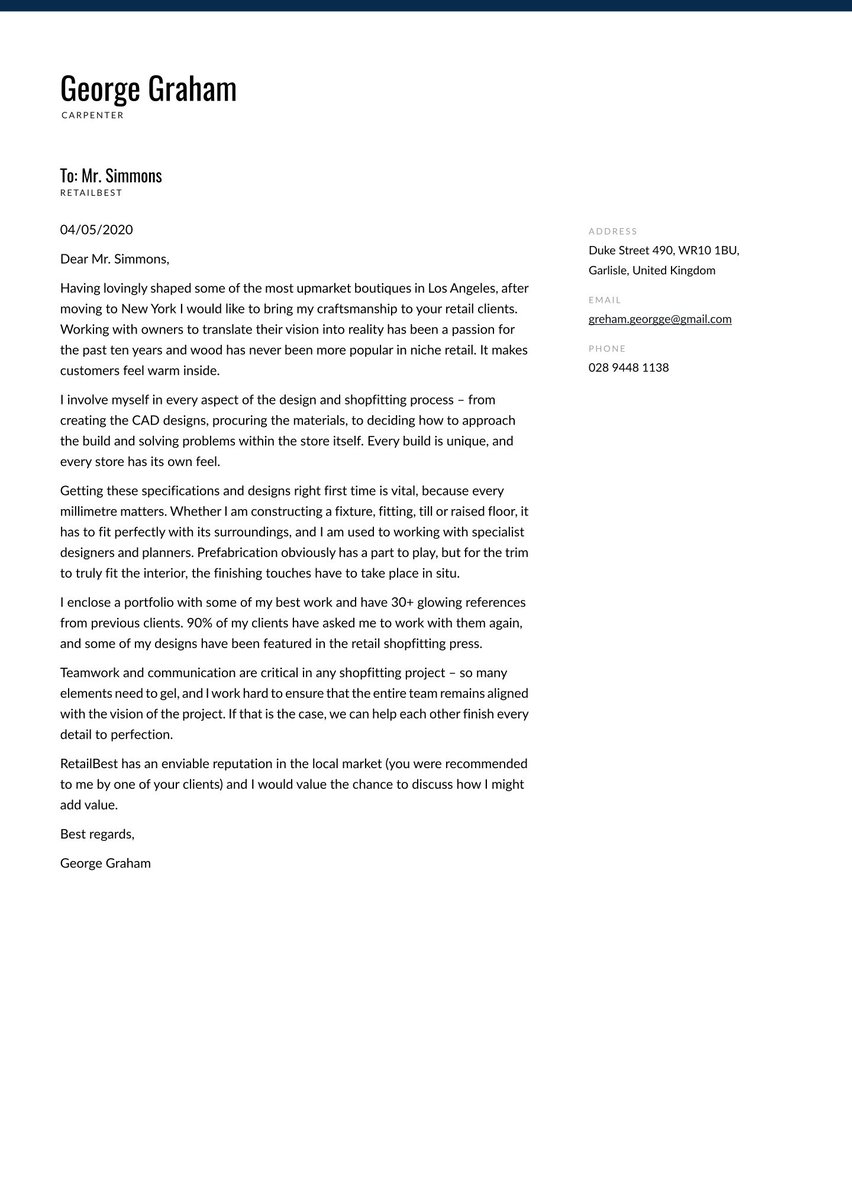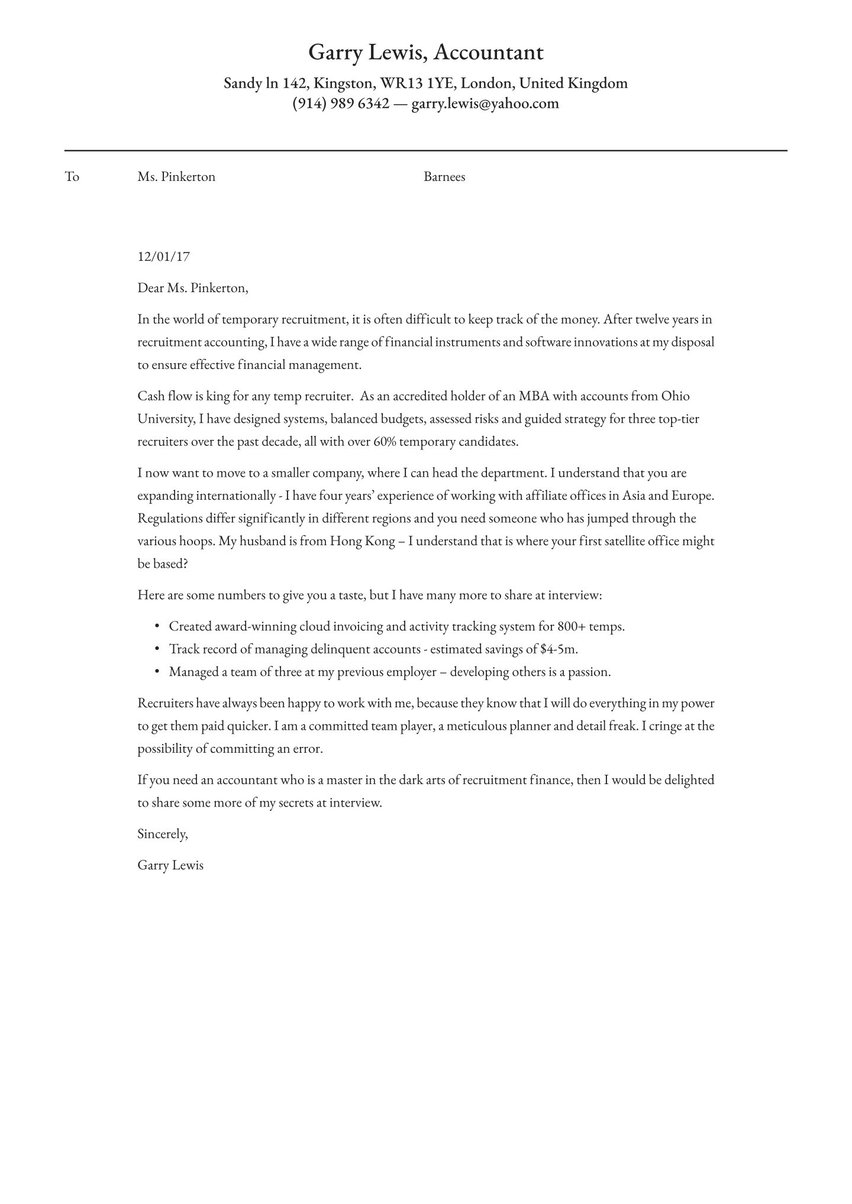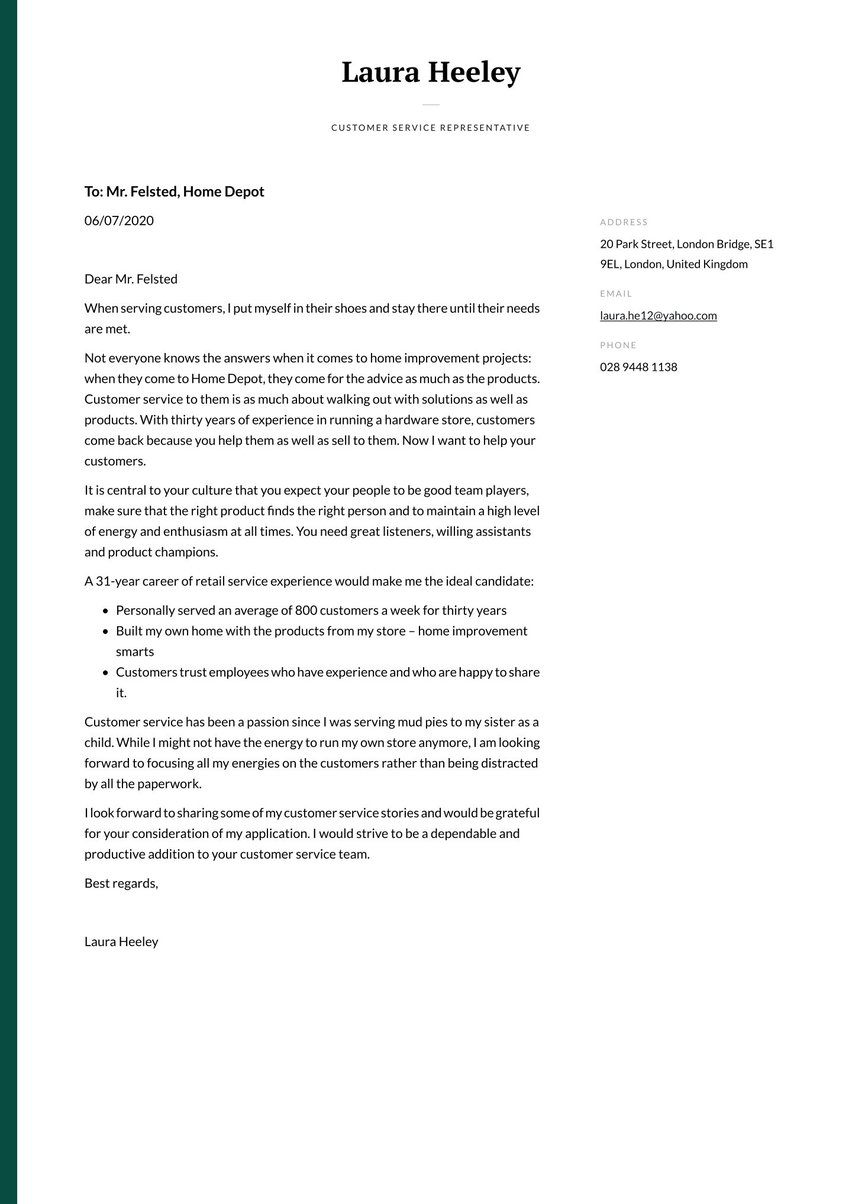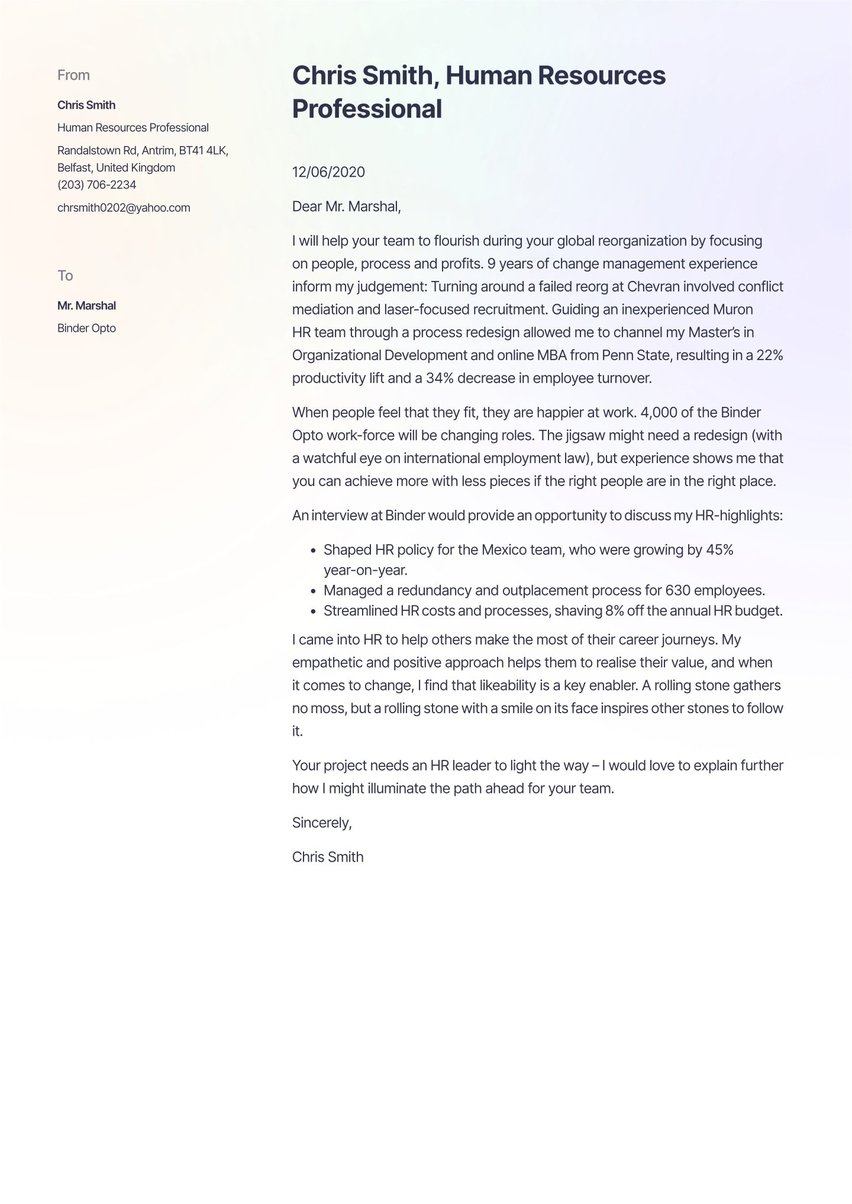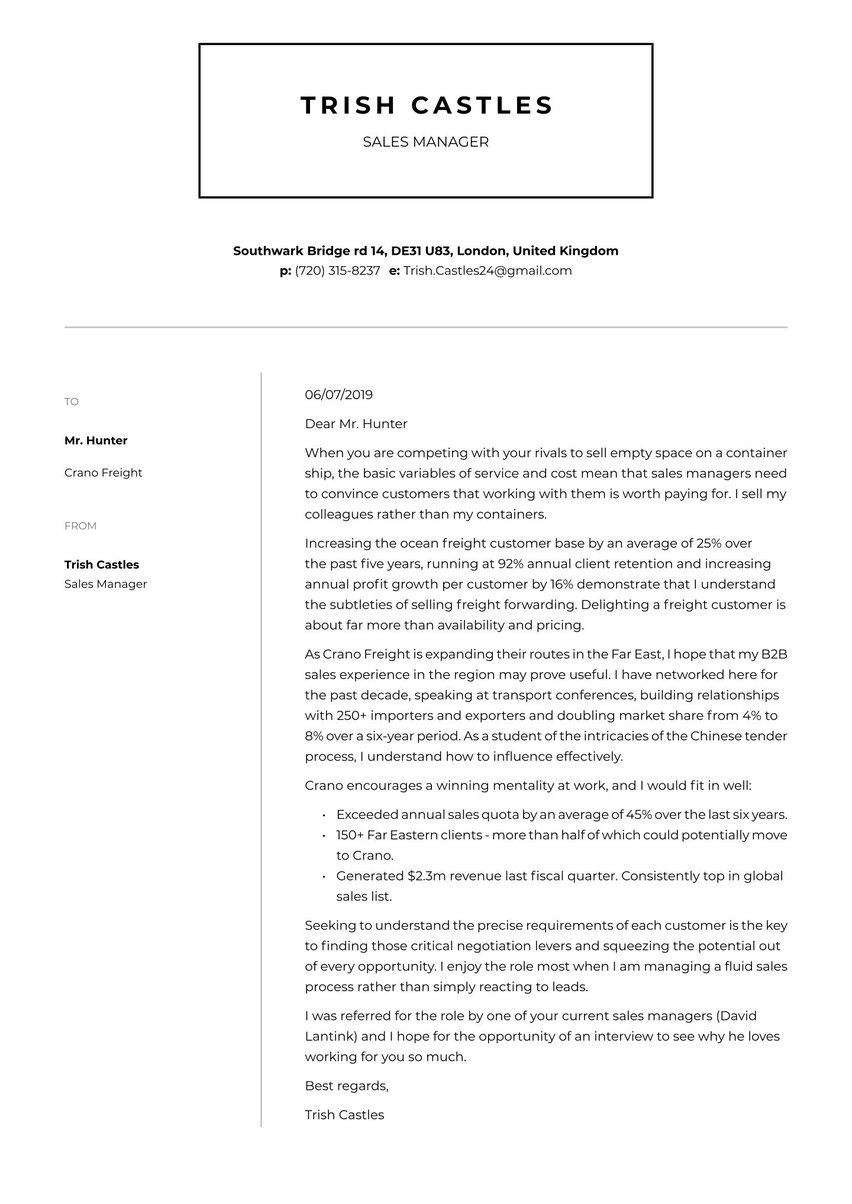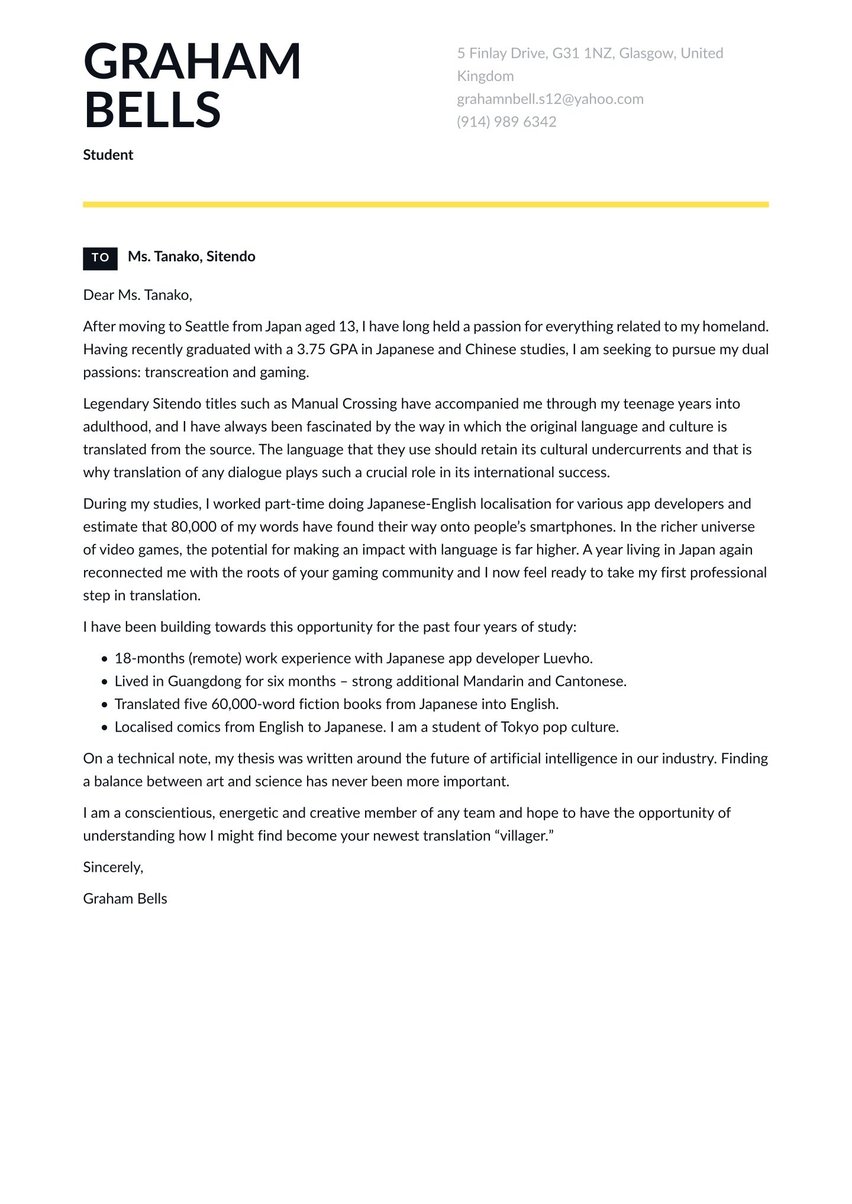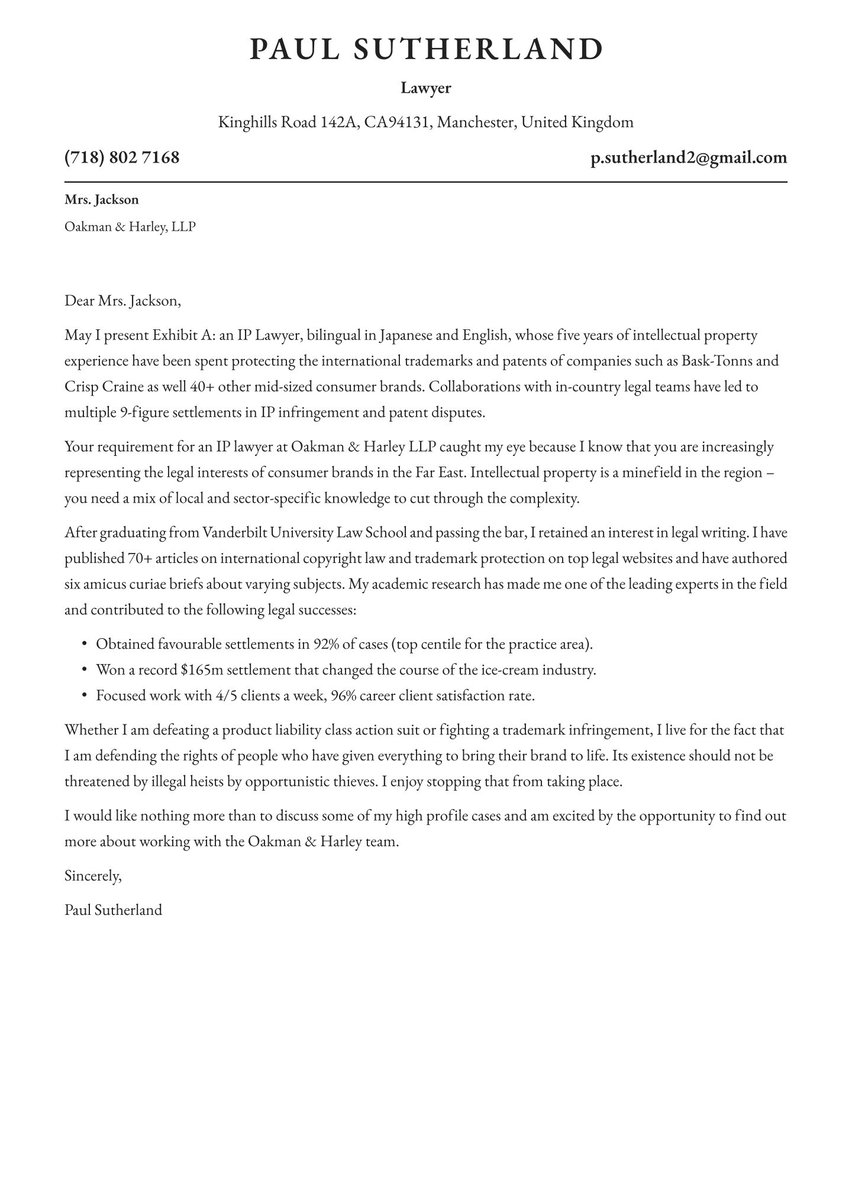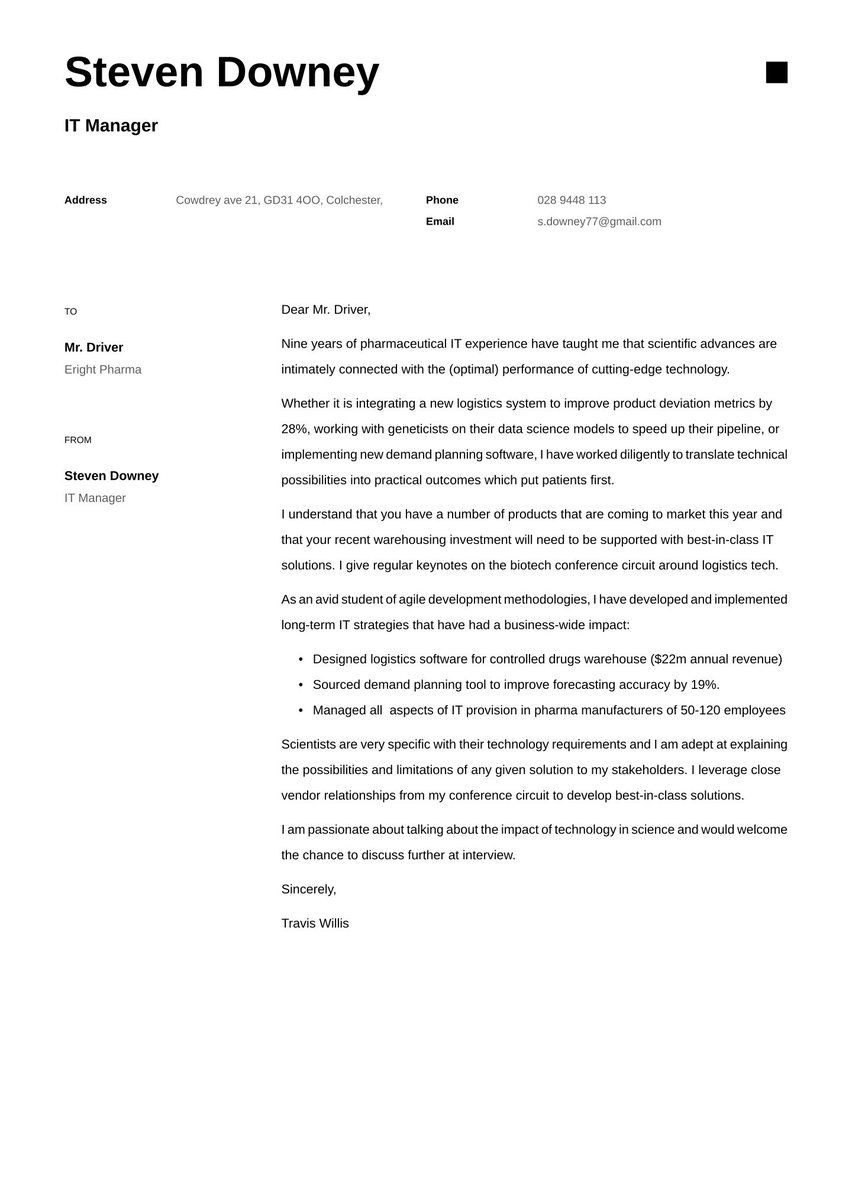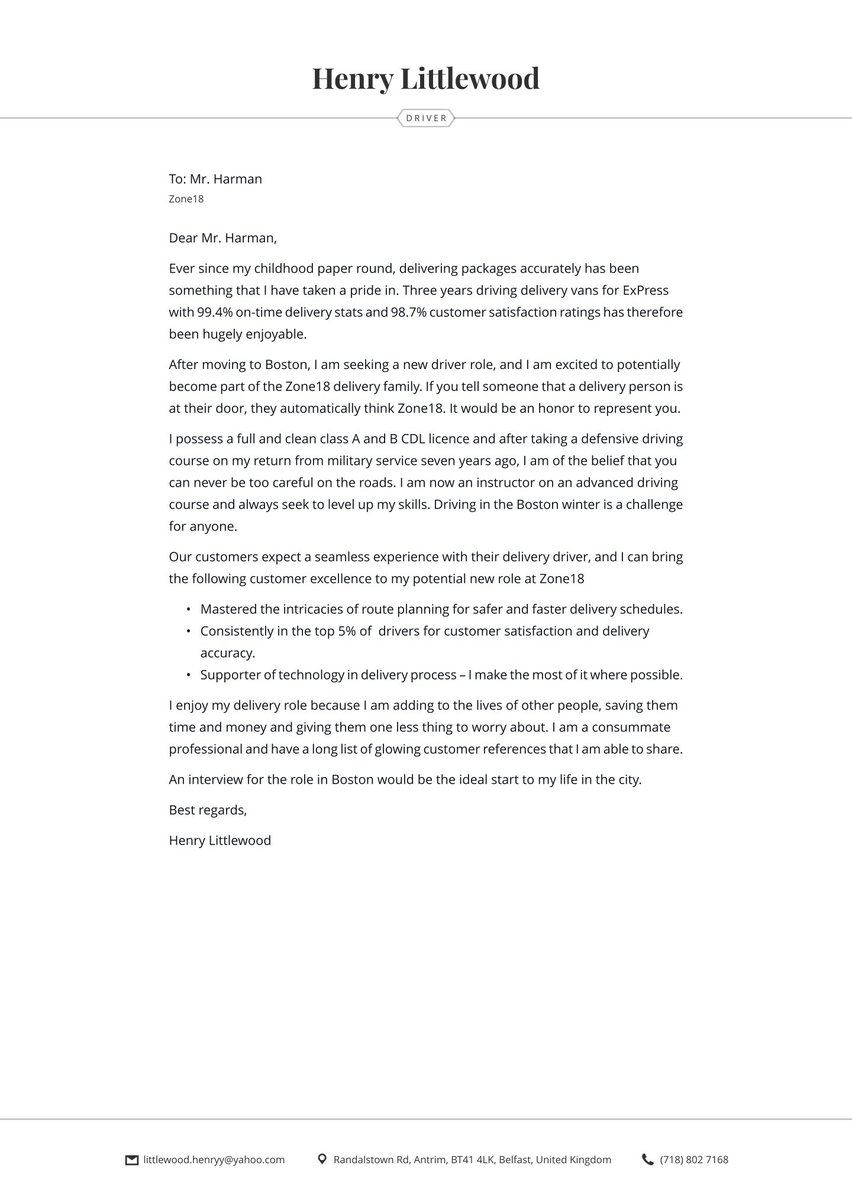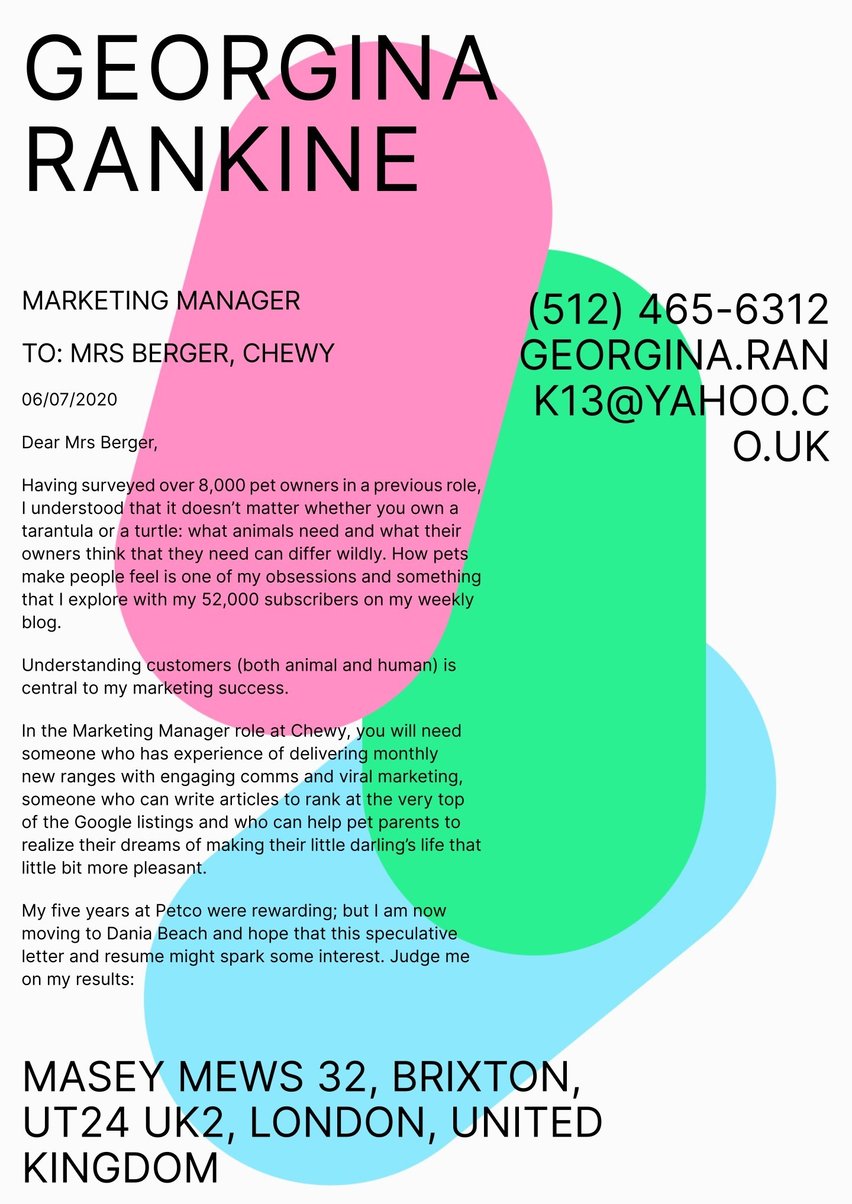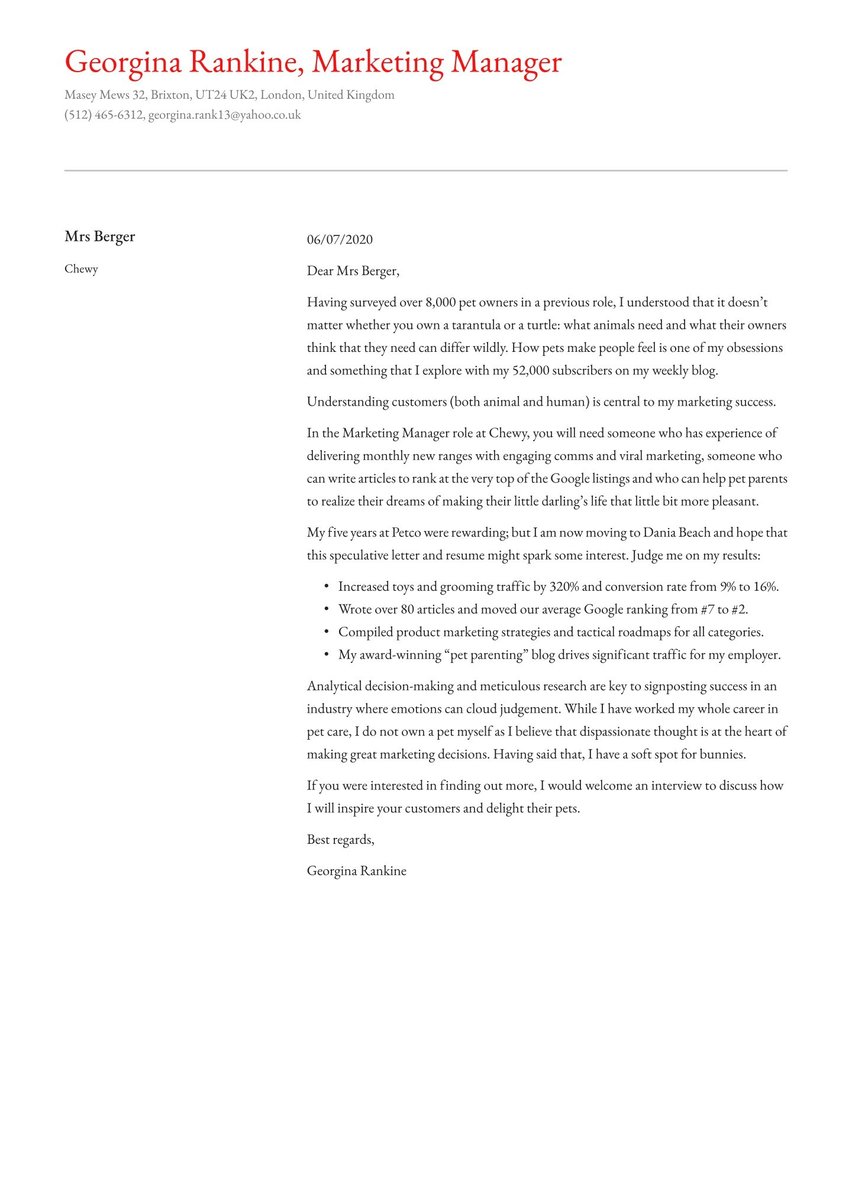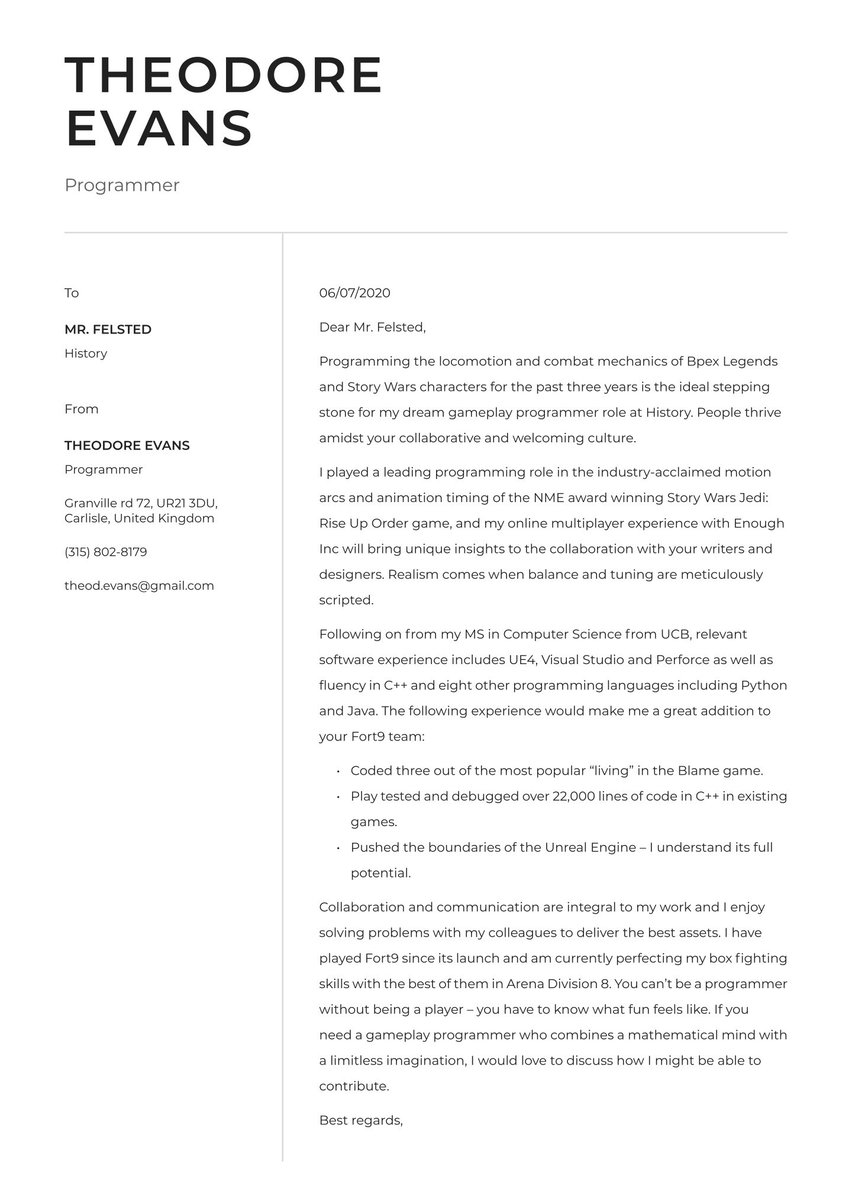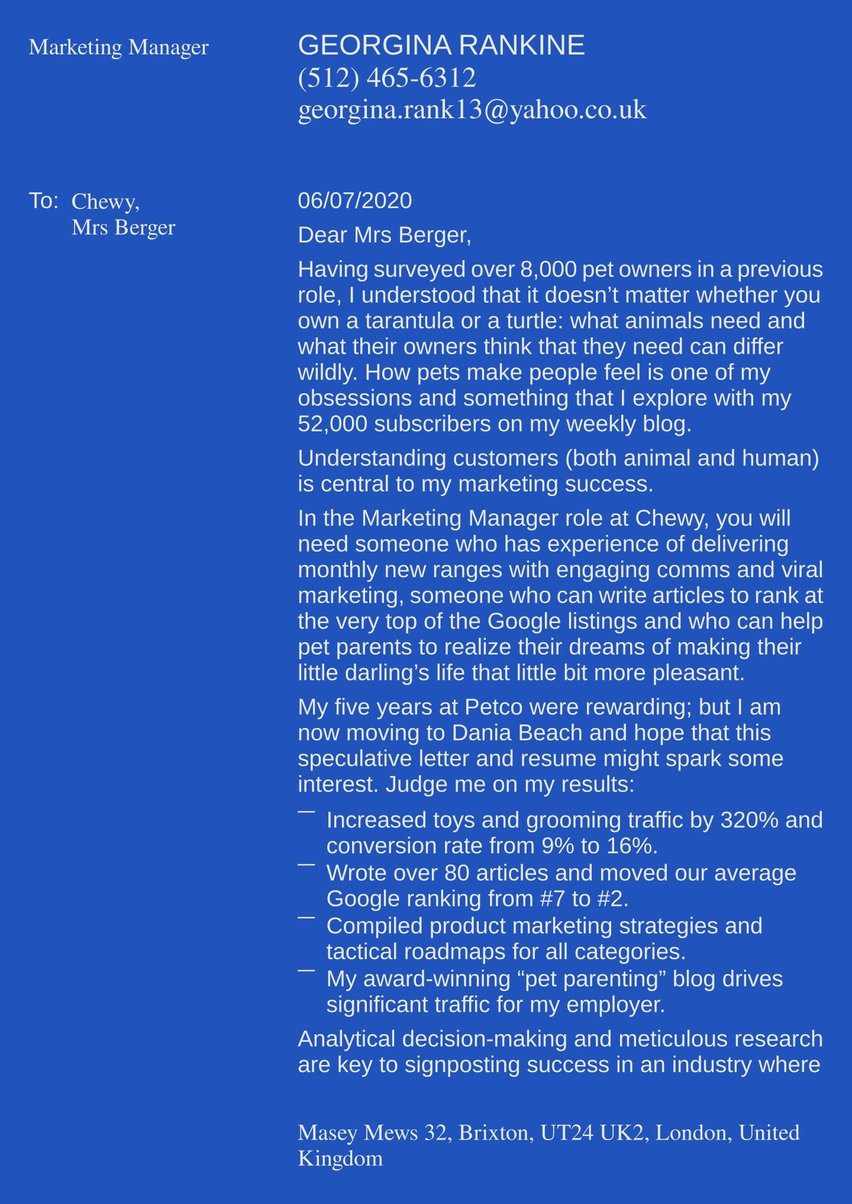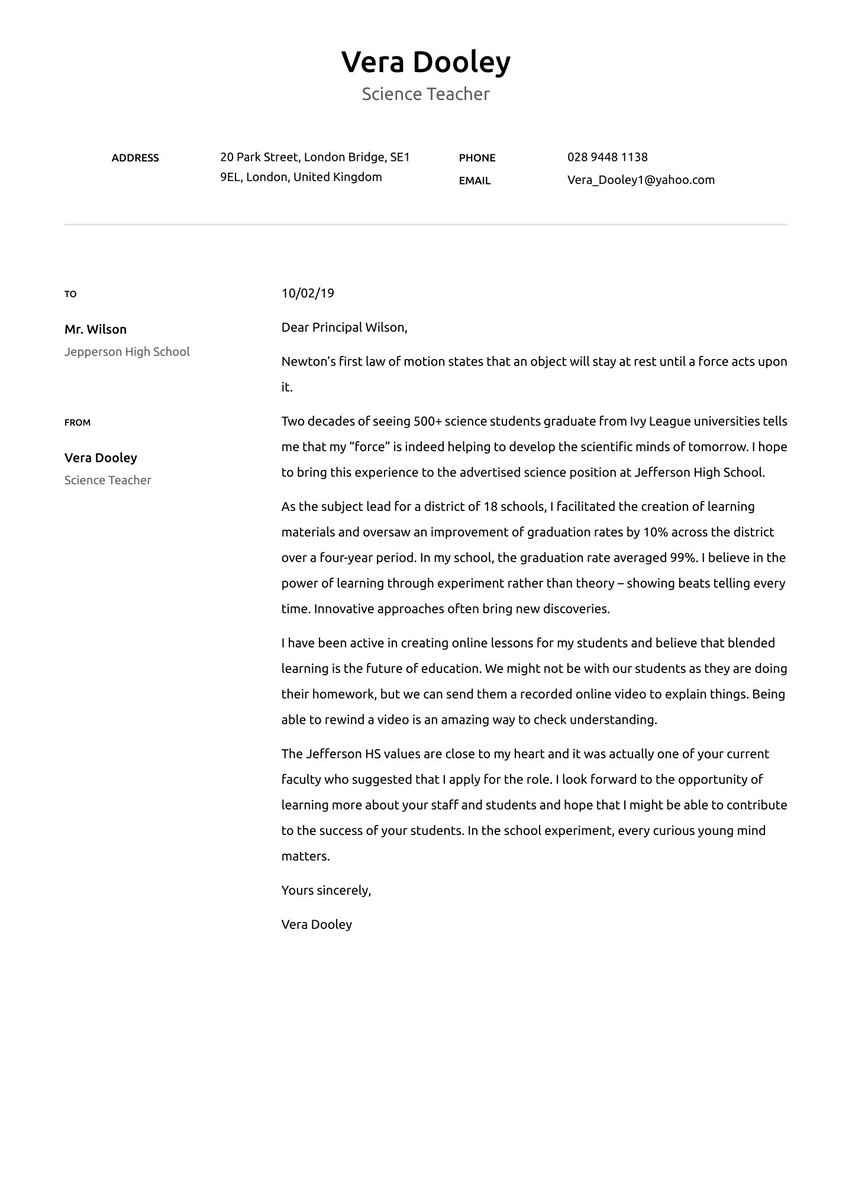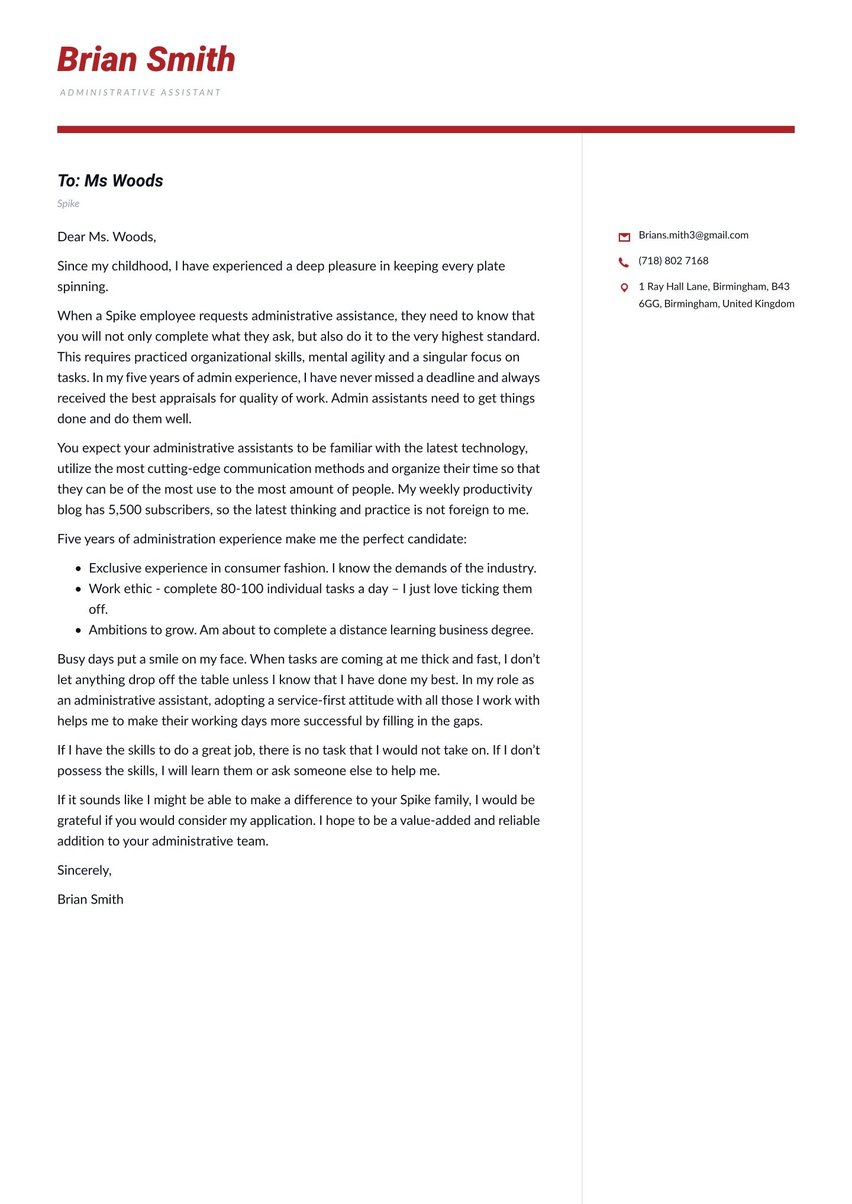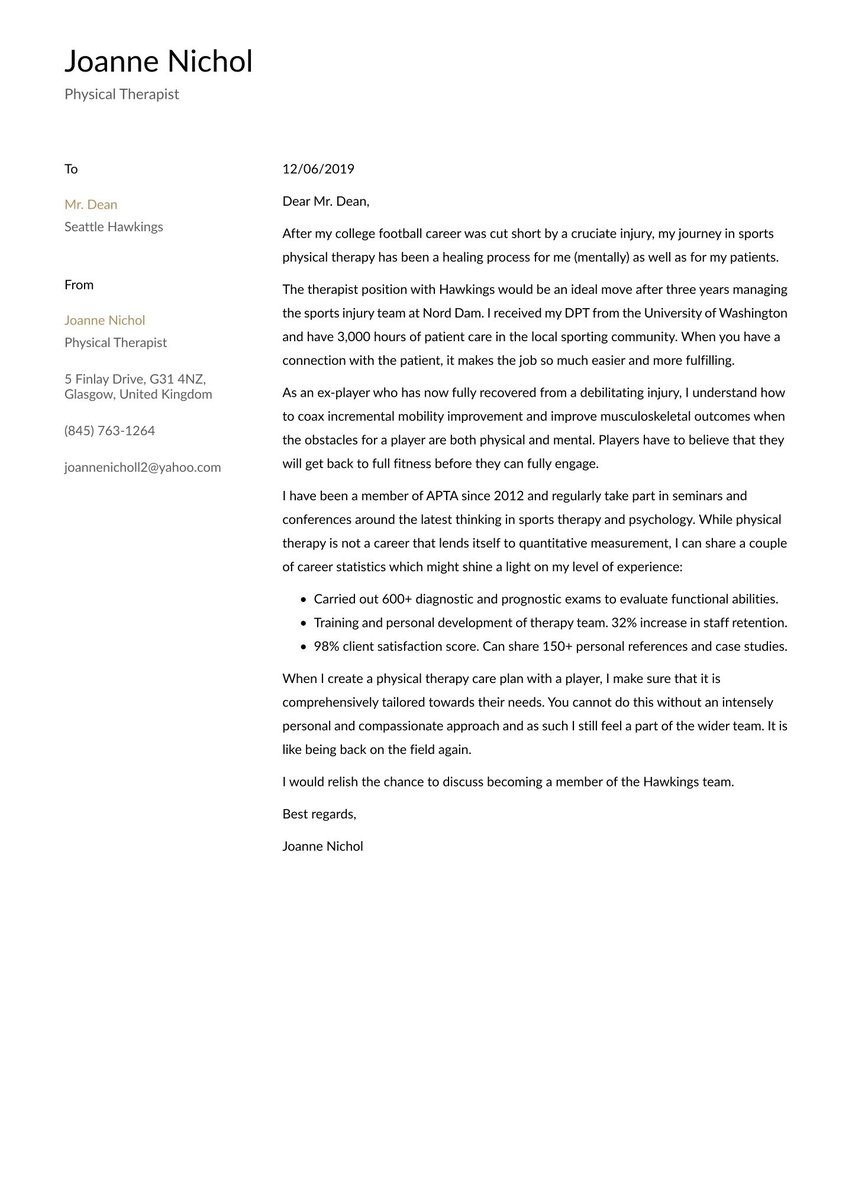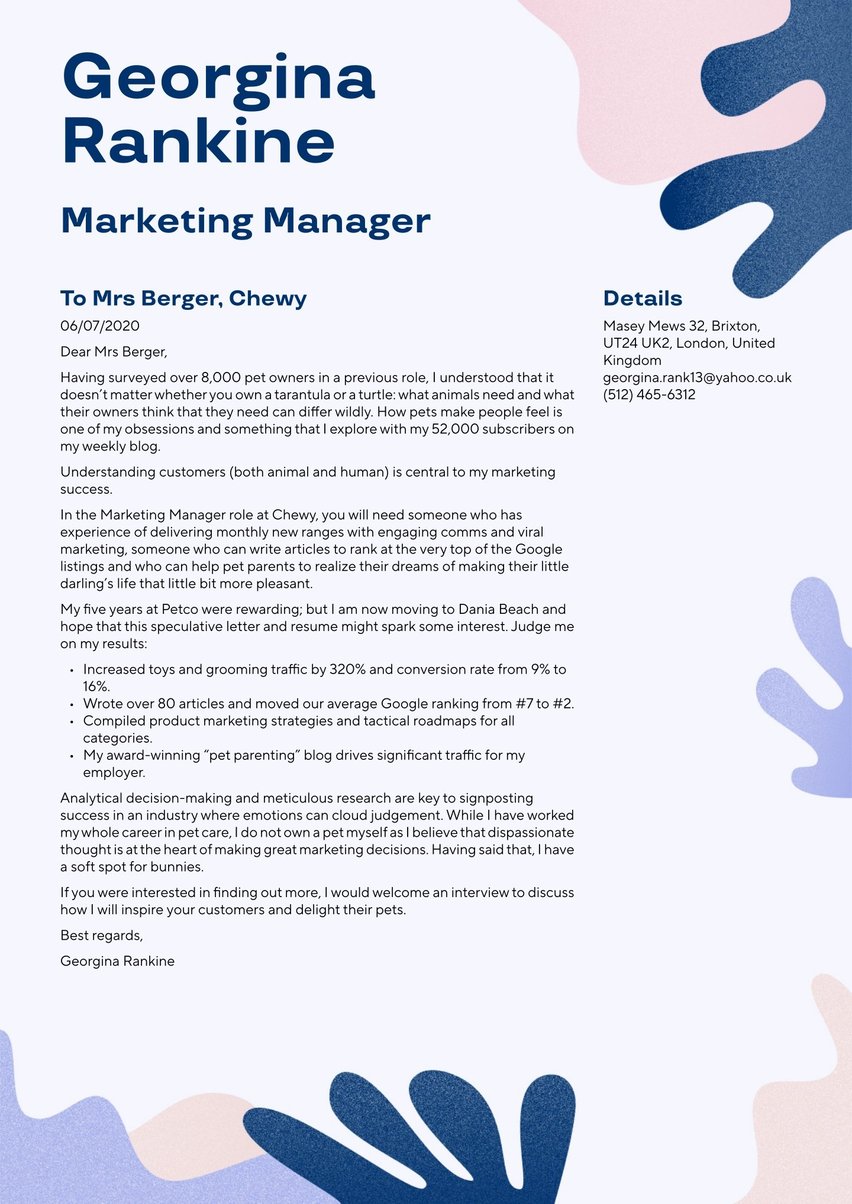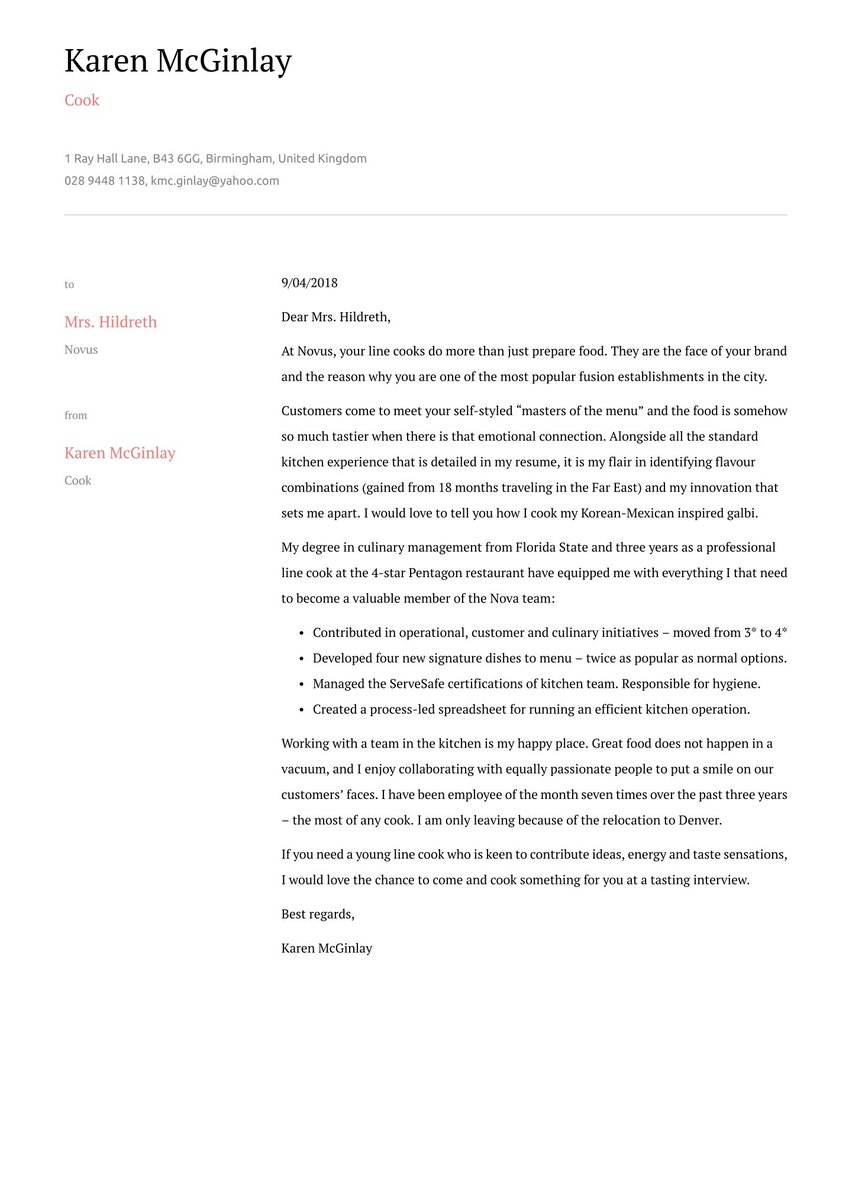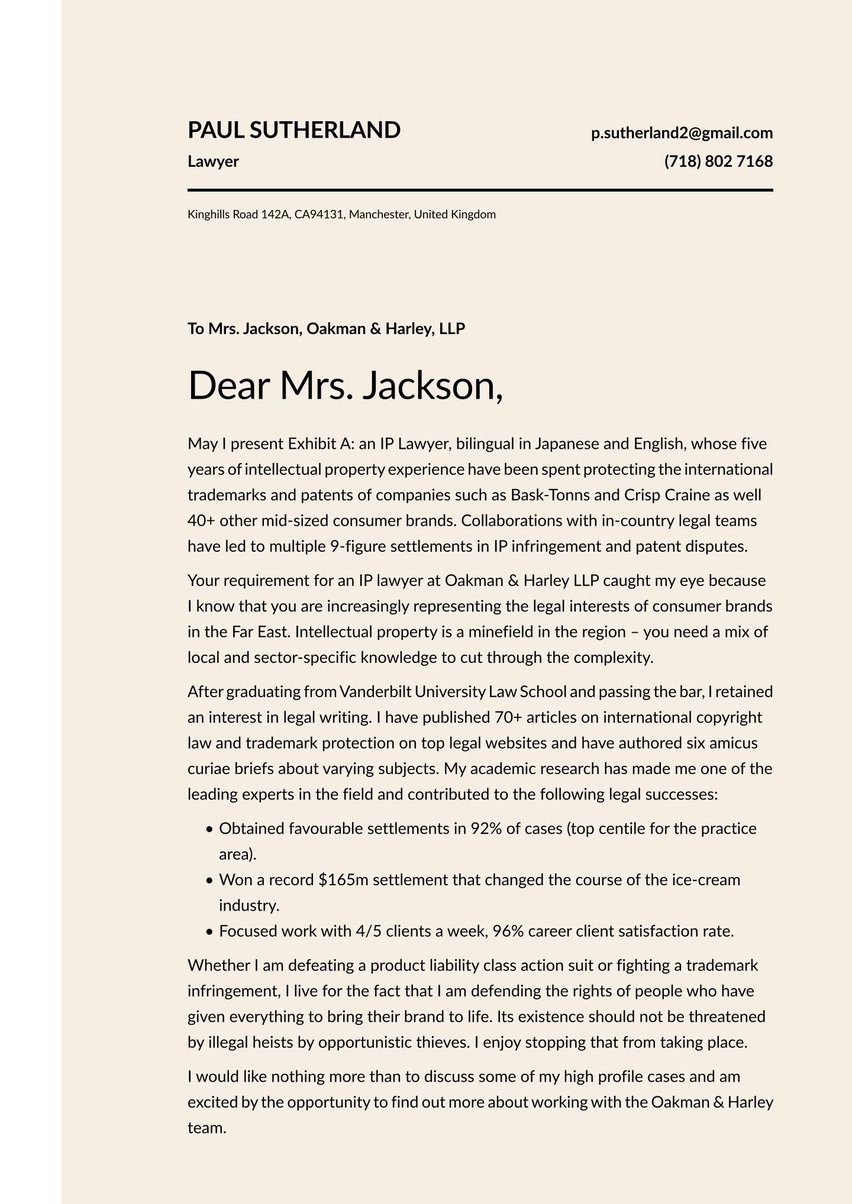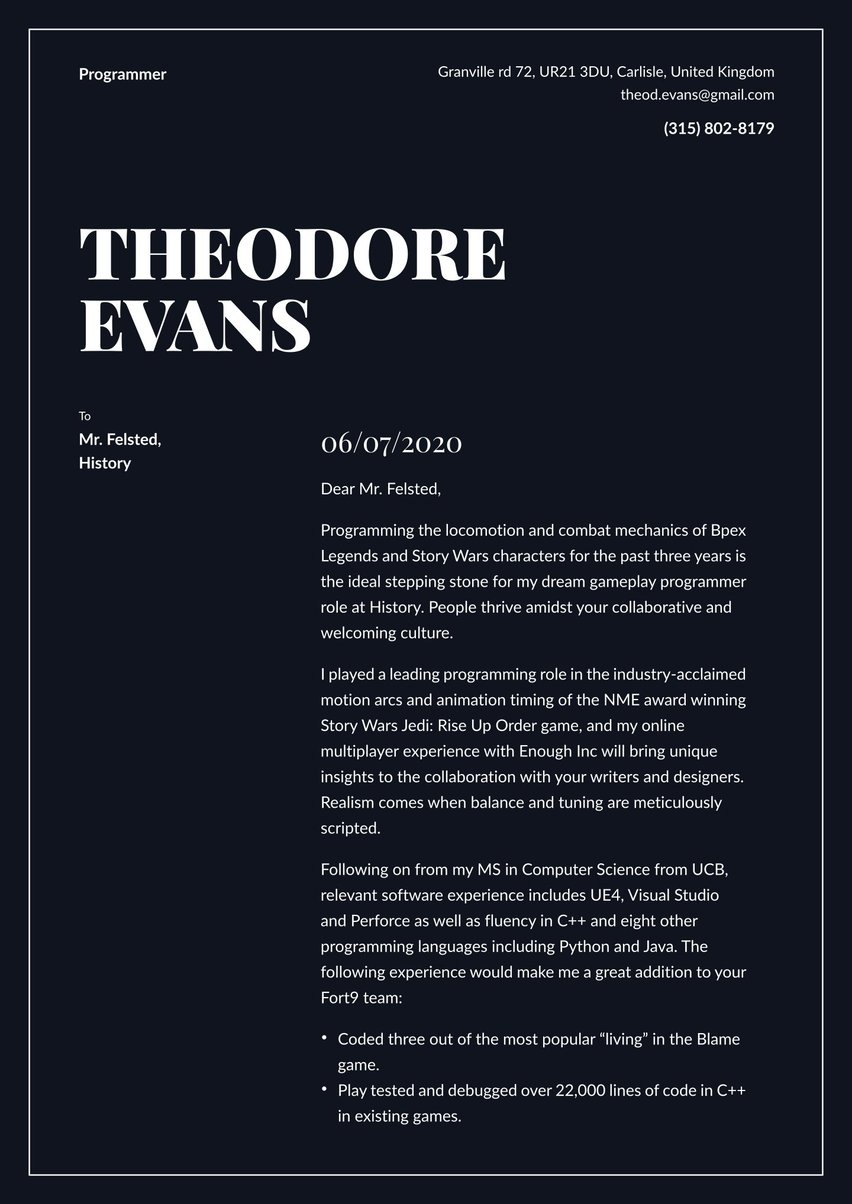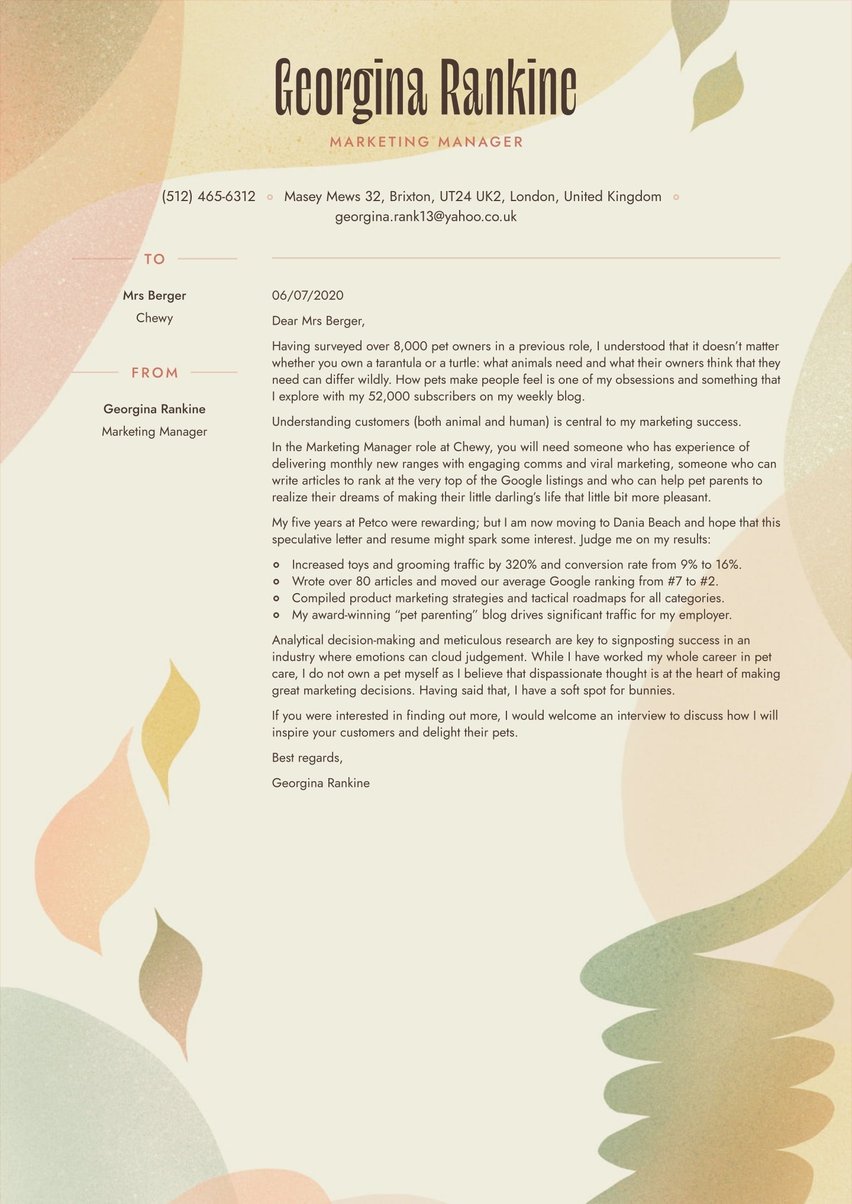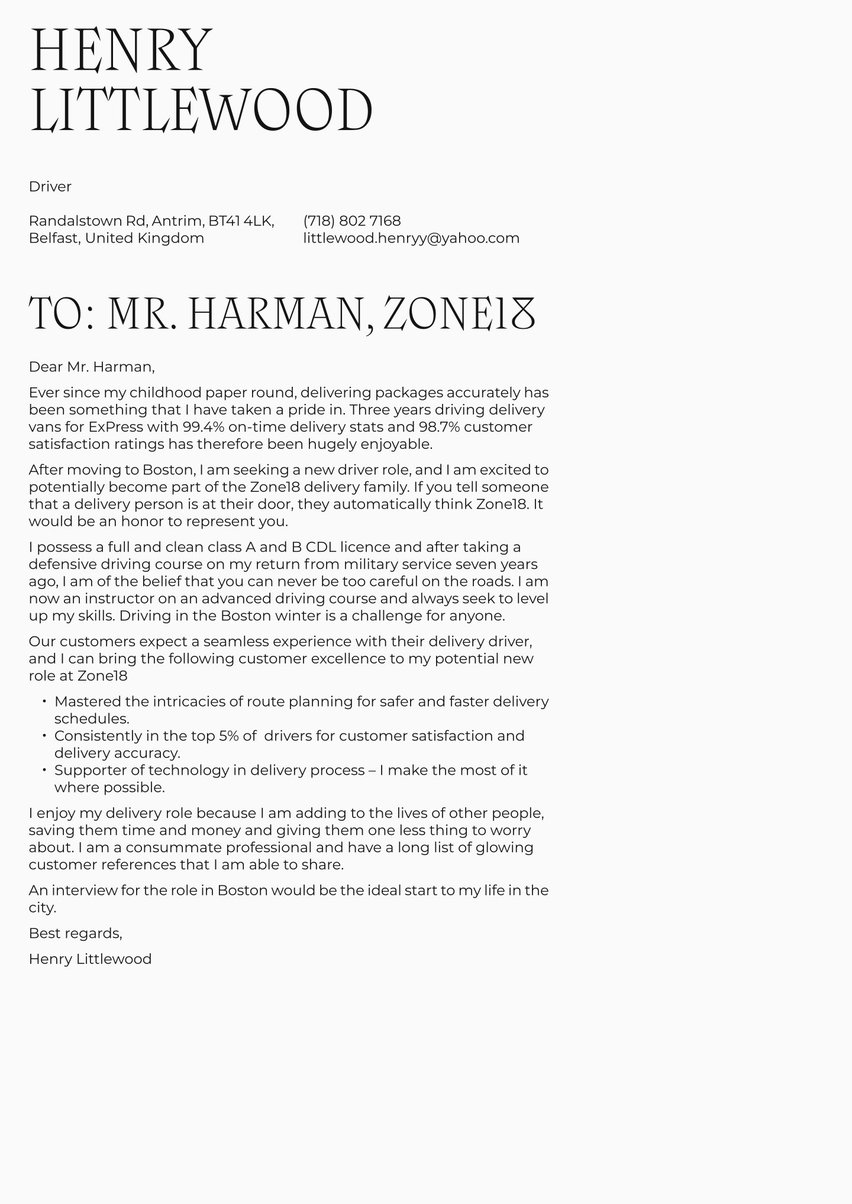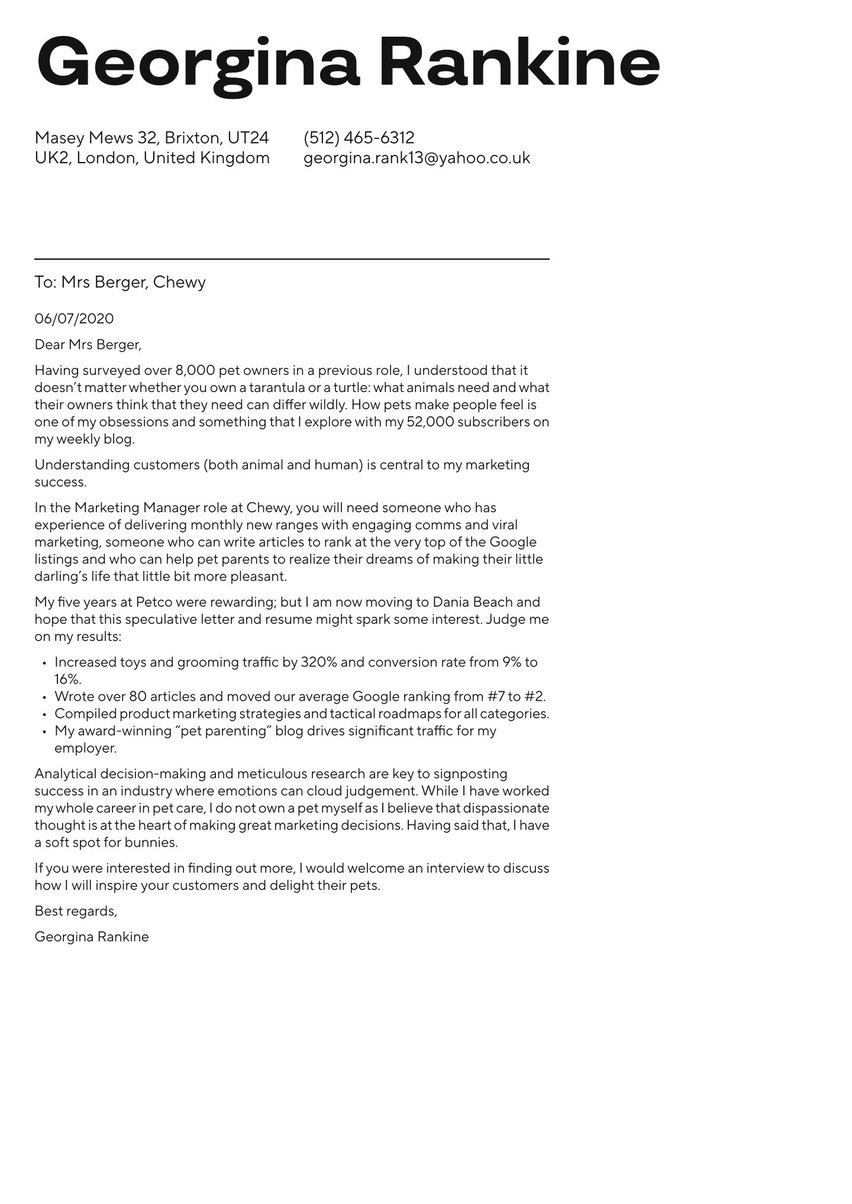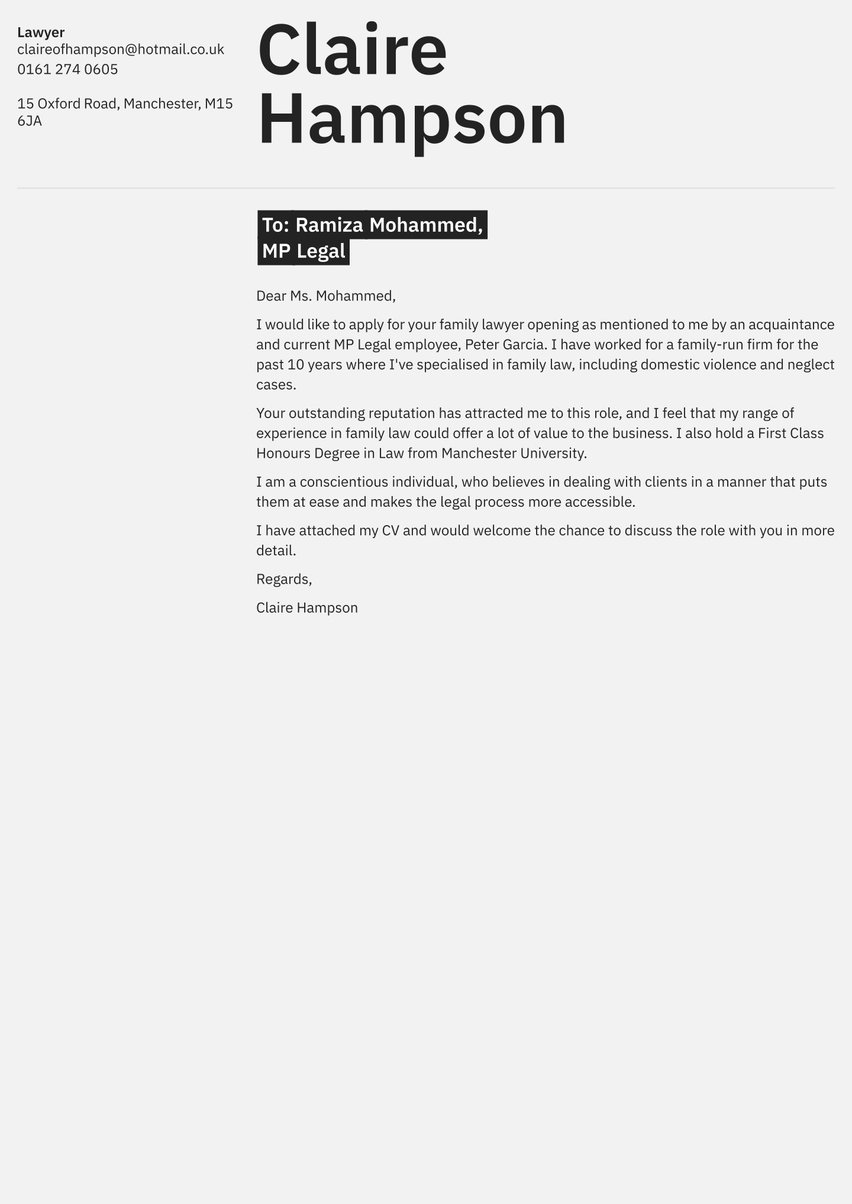Looking to make your mark in retail? Retail offers a diverse range of opportunities in a dynamic and fast-paced work environment. There are also additional perks like flexible working and plenty of advancement opportunities. No wonder it’s an attractive sector to many people.
But, if you’re looking to get ahead of the competition and secure the best opportunities, having a stand-out cover letter for retail jobs is vital.
Luckily we have you covered! Follow our step-by-step guide (with examples) that will show you how to create a cover letter that generates immediate interest.
Retail full text-only cover letter example
February 7, 2024
Dear Ms. Cass,
Both expectant and experienced parents alike tend to stop for that little bit longer in the baby section of Asda — 34% longer, according to the research. Analysing customer flow patterns and product sales data, I estimate that over the past 13 years, I have helped over half a million of these shoppers make the best decisions for their little people.
That is a lot of baby chat, at an average of 16% YOY sales growth.
As people increasingly turn to shopping online, it is this intimate relationship with the in-store staff that keeps customers coming back. I offer reassurance, help them select the right products and my add-on sales are consistently at the top of the store rankings. I have no qualms about persuading people to buy better products for their children.
I understand the rigours of big box retail and would love to tell you about my awards for operational excellence. My merchandising solutions have been featured in the retail press and my stock management and shrinkage targets were rarely missed. You can’t rave to a parent about a product if it isn’t on the shelf.
My commercial and operational highlights would serve me well at RetailMart:
- Consistently exceeded sales and margin targets. Best year was +85% vs. budget.
- On-shelf availability averaged 99.2% and shrinkage kept under 0.5% (1% target).
- Promotional participation of 16% — cross-selling due to close customer relationships.
Managing varying-sized teams of sales associates has taught me the value of a cohesive target-led working environment, where every sale is celebrated as making a little life that bit better. I relish the chance to work with people who truly care and try to ensure that my own passion is as contagious as possible.
I became aware of the role from your department manager Joanne Grey, who is a personal friend, so I have an insider understanding of your culture and would love the opportunity of an interview to discuss how I might fit in.
Sincerely,
Lana Otterley
Sections of a retail cover letter
To ensure your retail cover letter is concise and impactful, it’s a good idea to follow a specific format and structure. This way you will stay on the right track and avoid including content that isn’t relevant. Here are the key sections you need to include:
- Cover letter header. Detail your essential contact information — including name, email, telephone number, and LinkedIn handle — in a professional cover letter header.
- Greeting. Personalise your greeting by addressing the hiring manager by name. If the job advert doesn’t include this information, check online or call the company to find out.
- Introduction. Hook the reader with a compelling introduction that sets you apart in the retail crowd. Share your enthusiasm for the role.
- Body. Highlight the most important aspects of your retail career to date as well as your relevant skills and abilities in the main (body) section of your retail cover letter.
- Conclusion. Summarise key points and reaffirm your strong interest in working with the company. Include a call to action to encourage the hiring manager to contact you.
- Signature. Wrap up with a professional sign-off, including your full name.
An ideal cover letter is no longer than one page and around 400 words (ideally 300 words). While it can sometimes be challenging to be concise, try to focus on communicating your suitability for the specific retail role in a direct and succinct way.
Always give your cover letter a thorough review once you’ve finished writing. This will give you the chance to streamline your letter and correct any typos or spelling mistakes.
Looking for more inspiration and ideas to get started on your cover letter? Check out these other cover letter examples for retail:
Another great resource is our article on how to write a cover letter. This provides comprehensive information and details about preparing each section of the perfect cover letter.
Once you’ve created a professional header and greeted the hiring manager, it’s time to move on and create a compelling introduction that will grab the reader's attention.
Introduction of a retail cover letter
What can you say to hiring managers to instantly get them to sit up and take notice? The first couple of sentences really need to make as much of an impact as possible; otherwise, why would anyone want to continue reading?
The introduction should provide information on your most relevant retail experience, spotlight stand-out achievements, and show the reader that you are familiar with the challenges of working in a retail setting.
Dear Ms. Cass,
Both expectant and experienced parents alike tend to stop for that little bit longer in the baby section of Asda, 34% longer according to research. Analysing customer flow patterns and product sales data, I estimate that over the past 13 years, I have helped over half a million of these shoppers make the best decisions for their little people.
Dear Anna
Hope you’re well. I am writing to apply for the retail role with Asda. I’ve acquired significant experience and success in retail, so feel ideally suited to this opportunity.
Highlighting relevant areas in which you have excelled in your retail career is going to resonate much more with the employer than a generic, run-of-the-mill type introduction. For example, if you’ve won an employee award or boosted sales by 15% YoY in your assigned product category, then this information should be front and centre in your cover letter introduction.
Your introduction doesn’t need to be long. This is more of a teaser to pique the reader's curiosity and encourage them to read on. Stick to two or three sentences that directly relate to the core goals and objectives of the job opening.
Dear Ms. Cass,
Both expectant and experienced parents alike tend to stop for that little bit longer in the baby section of Asda — 34% longer, according to the research. Analysing customer flow patterns and product sales data, I estimate that over the past 13 years, I have helped over half a million of these shoppers make the best decisions for their little people.
Retail cover letter body
Follow this proven approach when creating the body section of your retail job cover letter:
- Highlight your top-flight skills and experience in retail
- Demonstrate how you align with company culture
- Summarise key points via an impactful conclusion
- Wrap up with a persuasive call to action that compels the hiring manager to reach out
First body paragraph
The first body paragraph is where you can highlight the most important aspects of your career history. Entice the reader, giving the impression it would be foolish not to take your application forward to the next stage.
Here’s how to present your retail skills and experience in the best possible light:
- Showcase your retail achievements. Spotlight your achievements in the retail world, backed up with quantifiable data where applicable. Whether this relates to sales targets, upselling rates, scope and scale of the retail store, or number of customers per shift.
- Emphasise customer service skills. Recall times when you’ve delivered exceptional service. Share stories of how you used your knowledge of products to provide insightful advice to clients or dealt with difficult customers and resolved complaints.
- Teamwork and autonomy. Highlight your ability to work well in a team, as well as work effectively alone. Retail workers are people-centred but are expected to be able to work autonomously, as managers are usually behind the scenes.
- Supervisory roles. Mention your experience in any supervisory roles and how you have successfully motivated retail teams to achieve results.
Second body paragraph
Whether you’re targeting a niche retail store or a major multinational, addressing why you’re passionate about working there is likely to resonate with the hiring manager.
Researching the company website and social media platforms is a great way to connect your expertise to a company’s vision and values. You can then communicate this in your cover letter.
For example, Tesco state their core purpose as, ‘Serving our customers, communities and planet a little better every day,’ which is achieved by:
- Customers: Fully understanding customers in order to anticipate and respond to their needs and expectations.
- Communities: Creating good jobs, supporting local suppliers and producers, and helping local causes via community programmes.
- Planet: Focusing on sustainability across operations and the supply chain to reduce environmental impact and support healthier living.
Incorporating specifics from a company’s vision and values will ensure your cover letter leaves a lasting impression. For example, mentioning your ability to listen to customers, understand their needs, and deliver tailored solutions based on company products/services could strike a chord with a Tesco recruiter.
That is a lot of baby chat, at an average of 16% YOY sales growth.
As people increasingly turn to shopping online, it is this intimate relationship with the in-store staff that keeps customers coming back. I offer reassurance, help them select the right products and my add-on sales are consistently at the top of the store rankings. I have no qualms about persuading people to buy better products for their children.
I understand the rigours of big box retail and would love to tell you about my awards for operational excellence. My merchandising solutions have been featured in the retail press and my stock management and shrinkage targets were rarely missed. You can’t rave to a parent about a product if it isn’t on the shelf.
My commercial and operational highlights would serve me well at RetailMart:
- Consistently exceeded sales and margin targets. Best year was +85% vs. budget.
- On-shelf availability averaged 99.2% and shrinkage kept under 0.5% (1% target).
- Promotional participation of 16% — cross-selling due to close customer relationships.
Managing varying-sized teams of sales associates has taught me the value of a cohesive target-led working environment, where every sale is celebrated as making a little life that bit better. I relish the chance to work with people who truly care and try to ensure that my own passion is as contagious as possible.
Call to action & conclusion
Confidence is key when working in retail and dealing with a range of customers, especially when it comes to interacting with challenging clients! In the conclusion of your cover letter, reaffirm your interest in the role, while also leaving the reader without any doubt that you are confident in your abilities.
The end of your retail cover letter only needs to be a couple of sentences, but it should lead the reader nicely to your CV.
Feel free to also mention that you are excited about the prospect of exploring the role, and elaborating on your qualifications during an interview. This can be expressed without sounding presumptuous.
I became aware of the role from your department manager Joanne Grey, who is a personal friend, so I have an insider understanding of your culture and would love the opportunity of an interview to discuss how I might fit in.
Sincerely,
Lana Otterley
Sign off in a respectful way with a professional closing, such as ‘Sincerely,’ followed by your full name or typed signature.
How to write a retail cover letter with no experience
For many young people, a position in retail will be your first job. So, if you're new to the working world, you don't need to worry. Your cover letter is where you can make your case. Why is it that you will flourish in this position? Here's what you may choose to include:
- Mention any relevant volunteer experience. Include any volunteering you've done at events, schools, or community centres. Let the hiring manager know what experience you have already.
- Include academic background. Share the skills you have gained from educational courses, such as working on a group project and honing your communication and interpersonal skills. These soft skills are crucial in a retail environment.
- Highlight extracurricular activities. Are you a member of any clubs or participate in hobbies relevant to this sector? Highlight the skills — such as leadership and organisation — you have gained in these activities.
Key takeaways
When writing your retail cover letter, show the hiring manager that you are committed to delivering exceptional service and that you are commercially aware. Your cover letter should be concise, persuasive, relevant, and presented in a clear and professional format. Applying these strategies will help you get one step closer to landing your dream retail job.
Creating a retail cover letter template can be a headache. Make your life easier by using our cover letter builder to draft your next cover letter in a few clicks.

